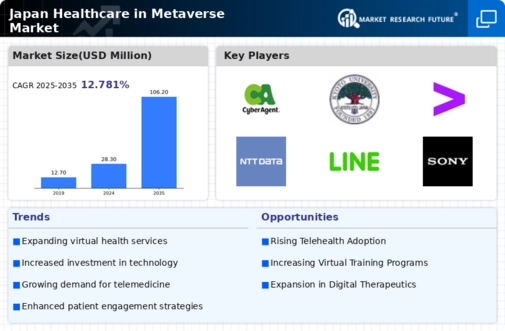Technological Advancements in VR and AR
The healthcare in-metaverse market in Japan is experiencing a surge due to rapid advancements in virtual reality (VR) and augmented reality (AR) technologies. These innovations facilitate immersive experiences for both patients and healthcare professionals, enhancing training and treatment methodologies. For instance, the integration of VR simulations in medical education allows practitioners to hone their skills in a risk-free environment. Furthermore, the Japanese government has been investing in digital health initiatives, with a projected increase in funding by 20% over the next five years. This financial support is likely to accelerate the adoption of VR and AR solutions, thereby expanding the healthcare in-metaverse market.
Increased Focus on Mental Health Services
The healthcare in-metaverse market is also being propelled by a heightened focus on mental health services in Japan. With rising awareness of mental health issues, there is a growing need for accessible and effective therapeutic solutions. The metaverse offers innovative platforms for mental health support, including virtual therapy sessions and support groups. Recent surveys indicate that around 40% of Japanese individuals are open to seeking mental health services through digital platforms. This acceptance suggests a promising avenue for the healthcare in-metaverse market, as it aligns with the evolving landscape of mental health care delivery.
Rising Adoption of Wearable Health Technologies
The proliferation of wearable health technologies in Japan is contributing to the expansion of the healthcare in-metaverse market. Devices such as smartwatches and fitness trackers are increasingly utilized for monitoring health metrics, which can be integrated into metaverse platforms for enhanced patient engagement. Recent data shows that approximately 30% of the Japanese population owns a wearable device, indicating a strong market presence. This trend not only empowers individuals to take charge of their health but also provides healthcare providers with valuable data for personalized care. Consequently, the intersection of wearables and the metaverse is poised to drive innovation and growth in the healthcare in-metaverse market.
Regulatory Support for Digital Health Innovations
Regulatory frameworks in Japan are increasingly supportive of digital health innovations, which is beneficial for the healthcare in-metaverse market. The Japanese government has implemented policies aimed at promoting telemedicine and digital health technologies, streamlining the approval processes for new solutions. This regulatory environment encourages investment and development in the healthcare sector. For example, the Ministry of Health, Labour and Welfare has reported a 15% increase in the number of approved digital health applications in the past year. Such supportive measures are likely to foster growth in the healthcare in-metaverse market.
Growing Demand for Personalized Healthcare Solutions
There is a notable shift towards personalized healthcare solutions in Japan, which is significantly impacting the healthcare in-metaverse market. Patients increasingly seek tailored treatment plans that cater to their unique health needs. This trend is reflected in the rise of digital health platforms that utilize data analytics to provide customized care. According to recent statistics, approximately 65% of Japanese consumers express a preference for personalized health services. As healthcare providers adapt to this demand, the integration of metaverse technologies is expected to enhance patient experiences and outcomes, further driving market growth.




















Leave a Comment